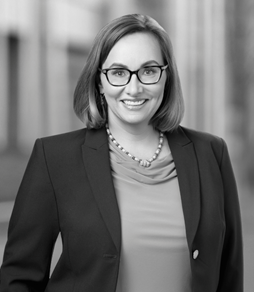 ISLP volunteer Suzanne Perry, a partner in White Case’s Energy, Infrastructure, Project and Asset Finance Practice based in Washington, DC has over 20 years of experience in cross-border energy and infrastructure transactions. Suzanne and fellow White & Case partner Jeannine Acevedo, who advises clients on energy and transportation infrastructure mandates, delivered a workshop for Ecuadorian government and private sector participants on Public-Private Partnerships (PPPs) hosted by ISLP and Counterpart International – Ecuador. The convening was part of a two-year project to support multi-stakeholder engagement in Ecuador’s Open Government Partnership (OGP) National Action Plan. Over the course of the two-day event, more than 40 participants attended the convenings led by Suzanne and Jeannine as well as other experts from Ecuador, Chile, El Salvador, Colombia, and the United States. Read more about Suzanne’s experience as an ISLP volunteer in her own words:
ISLP volunteer Suzanne Perry, a partner in White Case’s Energy, Infrastructure, Project and Asset Finance Practice based in Washington, DC has over 20 years of experience in cross-border energy and infrastructure transactions. Suzanne and fellow White & Case partner Jeannine Acevedo, who advises clients on energy and transportation infrastructure mandates, delivered a workshop for Ecuadorian government and private sector participants on Public-Private Partnerships (PPPs) hosted by ISLP and Counterpart International – Ecuador. The convening was part of a two-year project to support multi-stakeholder engagement in Ecuador’s Open Government Partnership (OGP) National Action Plan. Over the course of the two-day event, more than 40 participants attended the convenings led by Suzanne and Jeannine as well as other experts from Ecuador, Chile, El Salvador, Colombia, and the United States. Read more about Suzanne’s experience as an ISLP volunteer in her own words:
1) Tell us about your volunteer experience with ISLP. What drew you to the volunteer opportunity? What project(s) have you been involved in?
We [Suzanne Perry and Jeannine Acevedo, ISLP volunteers from White & Case] were contacted last summer to participate in a training program on public private partnerships in Ecuador. It’s a country in which I’ve done financings before, that I find fascinating, and that I knew I would like to get to know better. Meanwhile, this is a point in history when investment in next generation infrastructure and social services is particularly important – global challenges are driving people apart and we particularly need to focus on infrastructure that helps keep us connected. The opportunity to help increase understanding of how public private partnerships work – as a legal and practical matter – is an opportunity to help foster investment that can improve lives. We worked in an interdisciplinary manner – with academics from Universidad de Los Hemisferios, as well as engineers and bankers. Together, we gave a series of interactive presentations over a period of two days. It was held in Quito and we had participants from the government, from project developers and from financiers. Creating a workshop that brings together experience across multiple transactions was also a fun way to expand my “comfort zone”. It was satisfying to work in a cross-disciplinary manner with all of the participants, and to seek a higher-level perspective than what we see in the negotiations for any single transaction.
2) Is there a particular moment during the volunteer experience that stood out to you or that you have taken away as particularly significant?
In one of the first panels of the program, I was part of a panel with Ing. Darío Herrera (Ministro de Transporte y Obras Públicas) & Felipe Altamirano (Delegado del Secretario de Inversiones Público Privadas – ECUADOR). I was quite nervous, but María Fernanda Garcés (Escuela de Gobierno Universidad Hemisferios) is an excellent moderator. She put us at ease and challenged our thinking at the same time. The panelists had a good rapport with each other, and I felt like we were off to a good start. Later, I really enjoyed the synergies between my colleague Jeannine Acevedo and Schafik Collazo [ISLP volunteer and Salvadorian lawyer with extensive experience in PPPs]. Schafik was very frank in discussing the hard work and problem-solving that it took to develop a successful PPP program in El Salvador. I think this was a learning moment for the whole room because it was clear that the process is not easy and that, while certain challenges are unique to the sociopolitical context in Ecuador, this process is very much a marathon and not a sprint in any country.
3) What impact do you believe your ISLP experience has had? Why is ISLP’s work important?
On the macro-level, I hope that participants in this program took away some concrete learning that can contribute to well-executed, sustainable infrastructure in Ecuador. The more immediate impacts may be just as important, however. This was a way to connect – after two years of COVID separation – on a personal level with professionals who have been working through similar challenges but largely without knowing each other. Those linkages of people and ideas are hopefully a starting point that can lead to continued learning and opportunities. That ability to bring people together to work on common problems and solutions is a great value that ISLP brings to the table. I look forward to continued dialogue that has grown out of this program and to opportunities to work on other ISLP programs in the future.
4) Is there anything else you’d like to share with us?
Both within and outside of the conference, Jeannine and I got to know some really impressive Ecuadorian lawyers and leaders. I’m grateful that you contacted us!
